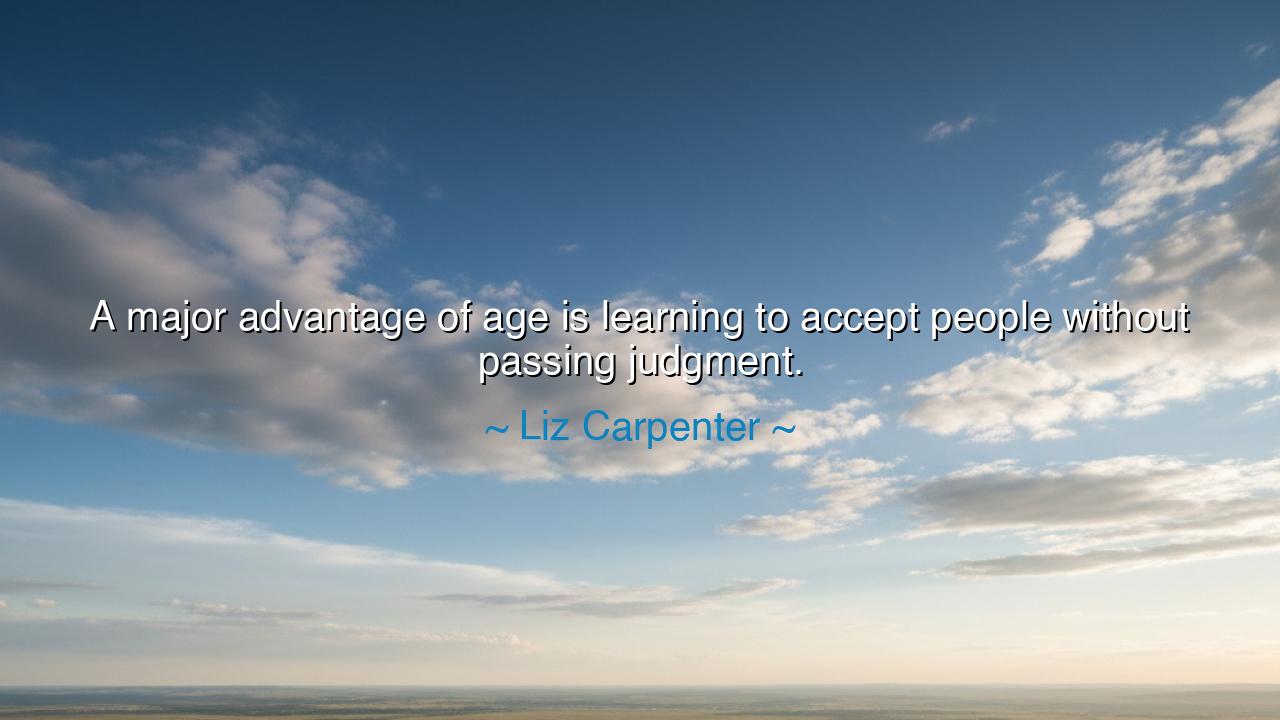
A major advantage of age is learning to accept people without






In the long journey of life, as the years pass, there comes a time when the lessons of experience and the wisdom that accompany age can shift the way we view the world. Liz Carpenter, in her quiet wisdom, once said, "A major advantage of age is learning to accept people without passing judgment." These words ring with the resonance of ages past, reminding us that with maturity comes a deeper understanding of humanity and the ability to see others not through the lens of criticism but with an open heart. In this profound statement, Carpenter highlights an essential truth—that judgment is often rooted in our own insecurities, prejudices, and ignorance, and that true wisdom lies in the acceptance and love of others as they are.
In the ancient world, the great philosophers often sought to define the virtues that could lead to a fulfilled life. Socrates, for example, devoted much of his life to questioning the assumptions that underlie human behavior. He famously said that "the unexamined life is not worth living," but in his later years, he learned that it was not just the examination of oneself that mattered, but also the examination of others with compassion rather than criticism. Socrates came to understand that wisdom was not just about knowing oneself but also about understanding that every human being was on a journey of their own—one that demanded respect, regardless of how different their path might seem.
Similarly, Aristotle taught that the truly virtuous person is not one who simply excels in their own endeavors but one who can accept others and see beyond superficial differences. In his writings, Aristotle emphasized that the foundation of ethical behavior is not just in following rules but in developing a deep understanding of others' circumstances, challenges, and motivations. He spoke of the Golden Mean, a concept that suggests balance in all things—where extreme judgment and harshness toward others can hinder our growth and inner peace, while compassion and understanding lead us to wisdom and inner harmony.
In our own age, we see the story of Nelson Mandela, who, after spending 27 years imprisoned, emerged not with bitterness but with a deep understanding of the people who had once been his oppressors. Mandela’s ability to forgive and accept others, despite the injustices he had suffered, stands as one of the greatest examples of how age and experience can lead to the profound ability to see beyond the faults and failures of others. He chose compassion over judgment, a lesson that shaped not only his personal life but the future of an entire nation. Mandela’s wisdom was born from understanding that humanity is imperfect and that we all carry the capacity for both good and bad, but the true strength lies in our ability to embrace others, flaws and all.
The lesson in Carpenter’s words, then, is one that teaches us to value acceptance over criticism, especially as we grow older and gain more insight into the complexities of life. When we are young, we may judge others with the sharpness of youthful certainty, believing that our own perspectives are the only right ones. But as the years pass and we learn, we begin to see that life is not as simple as it once appeared. We come to understand that people are shaped by their own experiences, pain, and joy, and that to pass judgment is to deny them their own journey.
In the life of Mahatma Gandhi, we see another example of someone who, in his later years, grew into the wisdom of acceptance and compassion. Though Gandhi fought fiercely for justice and freedom, he also emphasized the importance of forgiveness and non-violence, not just in our actions but in our hearts. He rejected the idea that true freedom could come from judging others for their mistakes or failures, understanding that only through empathy and understanding could we begin to heal the divisions that separate us. For Gandhi, the ability to accept the flaws and imperfections in others was the key to building a compassionate world.
Therefore, the lesson that Carpenter imparts is clear: true wisdom comes not in judging others, but in accepting them with open hearts. As we age, we are given the privilege of seeing life’s complexities with clearer eyes, and it is our responsibility to approach others not with criticism but with compassion. Let us strive to follow the example of the great thinkers and leaders who have walked before us—Socrates, Aristotle, Mandela, and Gandhi—and embrace the world with the kind of wisdom that comes from accepting others as they are, without judgment. For in acceptance, we find not only peace but the deeper understanding that binds us all as part of the same human family.






AAdministratorAdministrator
Welcome, honored guests. Please leave a comment, we will respond soon